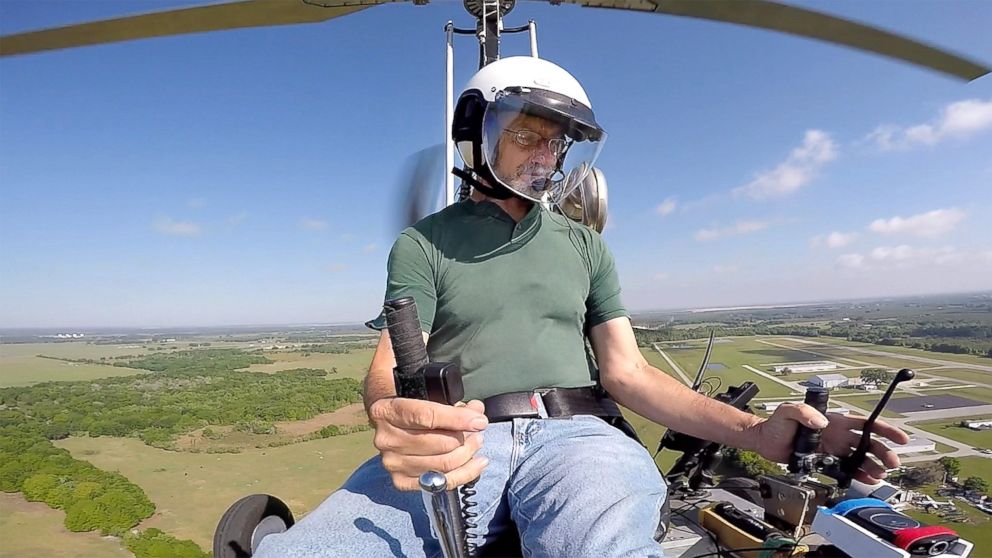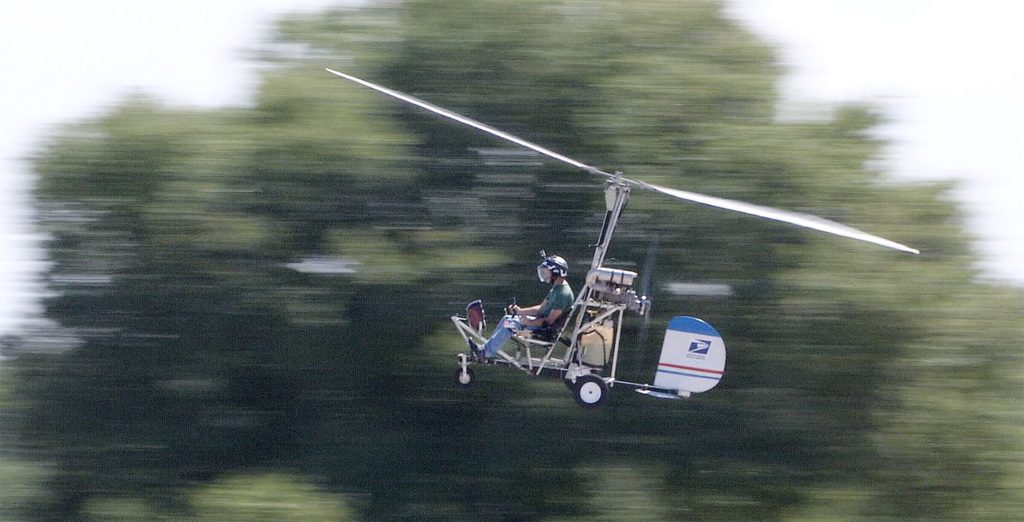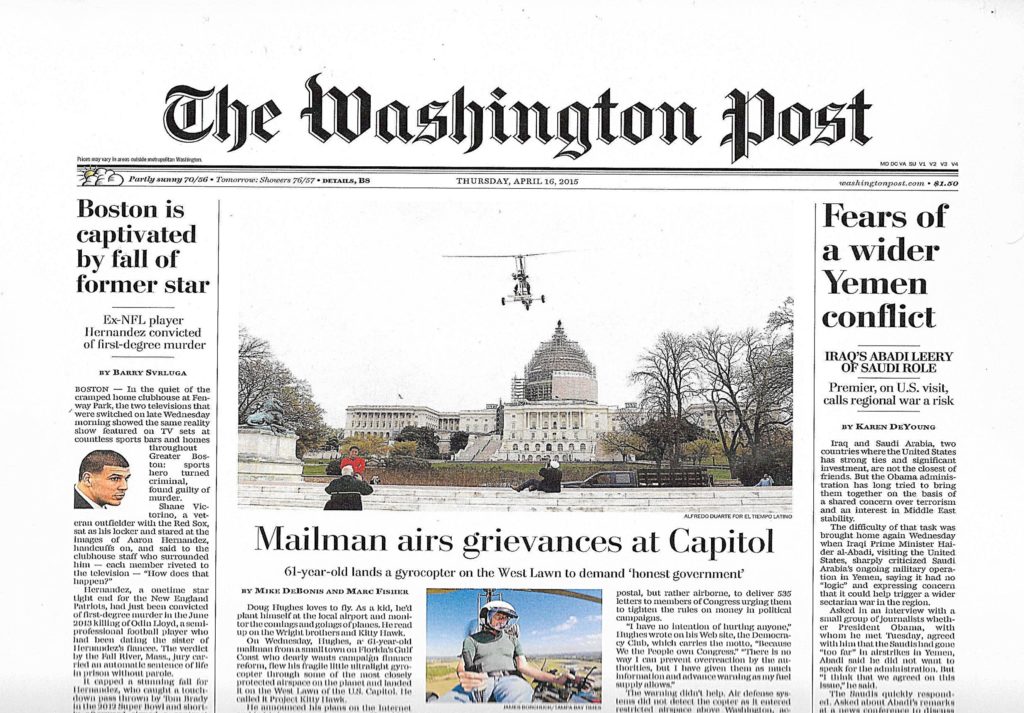This chapter occurs just after landing in front of the U.S. Capitol Building, about halfway through the book. Surviving had been the top priority, barely above delivering the message and the letters to Congress. Having survived, things were about to happen, things other people would control.
Chapter 19
Handcuffs and Bottled Water
The Rotax engine fell silent as I flipped down the kill switches—a chorus of sirens wailed. I’d been warned by a head in a blue uniform, “Don’t go anywhere!” He’d appeared momentarily on the far side of a low stone wall near the Capitol Building. With my right hand pressing the brake as hard as possible, I held up my left hand, palm out. It worked in cowboy movies and sci-fi flicks.
Somehow, they’d received no warning. The Tampa Bay Times had posted an article when I took off—or had they? Delay mail sent a letter to BarackObama.com—or had it? Mike called the U.S. Secret Service agent who interviewed us both—or had that failed? Eighty-five emails went out to news sites across the country—or had they not been dispatched? I’d been flying directly at Washington DC for seventy miles. How could they not know?
If the cops didn’t have advance warning, they also didn’t know that I carried a nonviolent message. Scared cops with guns—not a good thing. The main blades slowed and slowed, then stopped. I undid the chin strap and removed my helmet. They could see a sixty-one-year-old man with a silver beard, waiting with hands in plain view. Things I’d ordinarily do, dismount and secure the main blades, could wait. If somebody radioed the head in the blue shirt to ask, “What’s he doing?” the reply would be, “Nothing. He’s just sitting there.”
As soon as the blades stopped, cops closed in from the left and right. Hands checked my waist and chest for weapons or explosives.
“Get out of the plane!”
“OK. I got to take a phone out of my coat pocket.” An audio cable snaked from the camera to the phone in my postal jacket. The cops might not be delighted to see me reach for an electric anything in my pocket. To a policeman in DC, wires might suggest a bomb.
“Take it out,” he ordered.
I fished out two phones and set them by the throttle lever.
“Get out,” he repeated.
“I’m gonna undo my seat belt.”
“OK. Do it!” I heard irritation—he wanted me away from the gyro. I undid the belt.
“Get out!” he repeated.
“I’m gonna kick my leg over the stick,” I said, looking to the right side without moving.
“OK.” He sounded irritated but he got the message. I wouldn’t do anything unexpected. Standing out of the gyro, I withdrew the nylon cord from my jacket to tether the main blades.
“Drop it!” he commanded.
“I’m going to tie the blade so it can’t swing,” I said, gesturing at the overhead blade.
“DROP IT!” He wasn’t in the mood to entertain an explanation. As a “crime scene,” the police would secure the area. If anybody got injured, it could only be one of their own, and it’d be their own damn fault. I dropped the cord.
They followed procedure, I think. A cop at each elbow escorted me away from the plane and ordered me to empty my pockets. “What’s your name?” They fished my driver’s license from my wallet and it disappeared with one cop. A methodical pat-down confirmed no bomb and no weapons. They wanted my belt and shoelaces. I sat on a park bench to attend to my shoes. “What’s your current address?” Shoelaces, belt, and the rest of my stuff disappeared with another cop. Once standing again, they cuffed my hands behind my back.

I shivered, literally shaking from the cold. An hour in the frigid wind had sucked the heat out of my body. I couldn’t feel my lips or chin and my speech slurred. One of the police asked if I needed medical attention. If I said “yes,” I’d probably go to the hospital, and then jail. If I said, “no,” I’d go straight to jail.
“No,” I said. They didn’t know it, but we needed to talk.
Bystanders recorded the scene with their camera phones. Maybe that’s why theDC cops used the least force necessary to apprehend me.
From the bench seat of a police van facing out the back window, still cuffed, I rode to the station. Once we were there, I saw my property laid on a countertop, shoelaces and all. They wanted my signature for the confiscated property and asked if I’d answer questions without an attorney present. To their visible surprise, I agreed.
I shivered in the hall, handcuffed. Someone draped a set of white coveralls over my shoulders. You can’t put on coveralls while you’re cuffed. After a long wait, three of us took a closet-sized elevator to the fifth floor, me, a uniformed officer, and a lady who I presume was a detective. On the fifth floor, a crowd of detectives in a big office eyeballed me as we went by. I figure they were detectives—they were in civilian clothes and had guns. They ushered me into the next room, a small windowless office dominated by a table and four office chairs. A man and woman were already seated, both dressed in civilian clothes. The lady from the elevator took the lead. At her invitation, I sat. She took the remaining chair to my right and she introduced the pair already seated. No handshakes.
“Would you like a bottled water?” she asked, then continued as if she’d just realized. “It’ll be hard to drink if you’re handcuffed. Maybe if we uncuff one hand and cuff the other to the chair?”
“Let the games begin,” I thought.
“Do whatever you think is safe,” I said.
Obviously, she’d already decided to release my hands. I think she intended for me to feel grateful and obliged. I didn’t see it that way. I’d granted the Washington police department an interview because I wanted the security forces to stand down. The fertile imagination of law enforcement could create chaos in DC defending against a non-threat. Washington National Airport might be shut down, the Capitol Building evacuated, and government offices disrupted. By talking, I’d bring the police to a valid estimate of the non-threat level and save god-knows-how-many man-hours by telling them where to look. The cuffs clicked and rattled, removed by the officer who left. He probably didn’t go far.
The detective across from me would take notes, explained the lead detective whose aura hinted of a shrink. Though friendly and professional my hosts were, I harbored no doubt as my bottled water appeared: I was a minnow in the company of three circling sharks.
They launched a pro forma inquiry, asking me the names, ages, and locations of my parents, current spouse, ex-wife, brothers, sisters, and my birthplace, education, job, yada, yada, yada. Everything but the dog’s name. That the cops spent valuable time on useless details irritated me, but I suppressed my objections. Eventually, we came to my son John. The reaction of shock and sympathy seemed genuine. The investigators continued to gather whatever information a prosecutor might need to hang me, but their attitude shifted when I became a full human being instead of just a suspect.
“What’s a gyrocopter?” began the substantive part of the quiz. I displayed the enthusiasm of an aerial proselyte explaining how a gyro worked. They probed for specifics, how far could it fly, how high I’d flown, and why. There’s a specific section of FAA rules that defines ultralights, I explained, which said I didn’t need a license and my gyro didn’t need to be registered. I neglected to mention my violation of FAR—Part 103, but the Federal Aviation Administration would be consulted.

An endless stream of documents, managed by the third detective, required my signature at every decision point, granting consent to search the SUV in Gettysburg, and refusing consent to search my phones. I expected that the SUV would be checked for explosives or weapons with or without my approval. They had the phones. If they could get a warrant, getting past the password might be a problem.
The direction of questions shifted when I lamented that the DC police didn’t anticipate my arrival.
“How would we know you were coming?”
“I sent an email—actually, a bunch of emails when I took off.”
“Who to?”
“BarackObama.com.” That provoked sideways looks.
“What did you say in the email?”
“Mostly it was one hundred and one reasons not to shoot me down.” That drew sincere laughs from all.
“Well they didn’t—what were the reasons in the letter?”
“All hundred and one?” More laughs. “Mostly, I emphasized that my flight was nonviolent and the administration could verify my intent.”
“Verify how?”
“The U.S. Secret Service, for one.” That drew sudden silence and more crosswise looks.
“The Secret Service knew about the flight?” The lady asking the questions implied her disbelief with the tone.
“Yes. They interviewed me at my home and at work in October 2013. The agent’s name and phone number are in the letter. I wanted the administration to verify with him before I landed.”
“And the other emails—who were they to?”
“They went to the media, about a hundred news sites, inviting them to watch the flight live and directing them to the story at the Tampa Bay Times website.”
“The media knew before?”
“Yes. There’s video, an interview, and flying that I did for the Tampa Bay Times.”
“How could they watch the flight?”
“I was live-streaming the flight through the Internet to my website.”
“You have a website?”
“Yes. I built TheDemocracyClub.org just for the flight.”
At this point, I noticed that the detective assigned to take notes hadn’t picked up his pen for anything.
Playfully, I said, “You need to write that down—The Democracy Club dot oh are gee.”
Everyone laughed, and perhaps they guessed that I guessed that the detectives in the adjoining room were listening in. The session lasted two hours, and the transcript ran over one hundred pages. The audio recording was no surprise, but I never saw the hidden camera that recorded everything. The video will never be released, I hope. I needed a shave, with my hair pointing all directions and with coveralls draped across my back I looked disreputable at best..
“Nobody asked me why I took off from Gettysburg.”
They waited.
“You have to ask,” I said.
Assuming his role as the straight man, the detective across the table asked, “Why… did you take off from Gettysburg?”
“Good question. First, because I had to fly with the wind or I’d have run out of gas. Mostly though, I flew from as far away from DC as I could to give y’all time to determine that the flight was a nonviolent protest.”

The lead detective left the room a couple of times, probably to consult with her peers next door. The cops weren’t argumentative. Any time I declined to answer, they moved on.
“How high were you flying?”
“I think there were times I got up to one thousand feet…Normal cruising for a gyro will be around 350 feet, and I’m guessing I spent most of my time at five hundred feet.”
No one knew why I hadn’t been intercepted, including me, but I hadn’t flown below treetop level for seventy miles.
Washington DC leads the world in the political science of covering your ass. Long before we finished, the DC police knew I’d executed the plan in full view of the media, and put out my version far in advance of the flight. The genie wouldn’t fit back in the bottle. The political machine had to respond to my version, not the event they’d like to create. I didn’t know then, but Ben’s story had posted at Tampa Bay Online along with James’s video. For the next 24 hours, everyone in the U.S. would know more than I did.
Into the second hour, I explained in an off-the-record, just-between-friends tone that in an emergency I would have put the gyro down on a rooftop, not the street, rather than expose anyone on the ground to danger. Mike and I discussed taking precautions to protect bystanders from the earliest days of planning. I expected the prosecution would claim reckless disregard for pedestrians. Getting it on the record that safety had been considered undermined the DOJ case. Bureaucrats weren’t the only ones trying to cover their ass.
The meeting wound down. How the authorities would react, even the DC cops probably couldn’t guess. Reviewing my performance and the video later, I made comments which I shouldn’t have and in a few places, I declined to answer when it served no purpose. For somebody who’d had no run-ins with the law besides traffic stops, I did OK.
The officer in a blue shirt returned to escort me for a bathroom break when the meeting ended. They cuffed me for the elevator trip downstairs. The windowless holding area contained a wooden bench against one wall and a desk in the opposite corner. My right wrist was uncuffed and my left wrist cuffed to a ring embedded in the wall at shoulder height when I sat on the bench. A cop stood like a military sentry in the hall at the doorway. It seemed excessive, considering they’d chained me to a concrete wall.
Very little had gone according to plan. The letters were delivered to the U.S. Capitol Building and I’d landed without injury or property damage. Perhaps my deed would start an avalanche of interest, discussion, activism, and eventual reform. Far more likely, the 250-pound gyro had left no mark on the capitol lawn or on history. I had done what I set out to do. The culmination of an obsessive quest might go unnoticed, my arrest might be a footnote in the police blotter, and my anonymous trial and incarceration end my relationship with Alena and Kathy.
Neither elated nor depressed, I accepted my situation as the climax of what I’d designed and executed. Curiosity and acceptance shared the same space in my soul. If the strongest blow for freedom that an aging mailman could strike wasn’t enough to change the country’s dangerous trajectory toward plutocracy, at least I’d struck the hardest blow possible.
But I wondered what was happening outside.